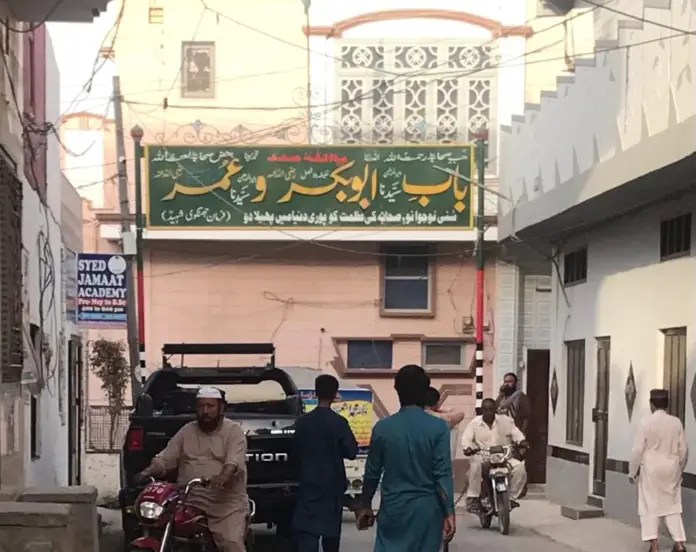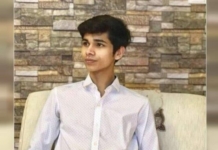Over two dozen people rush to embrace MPA Moavia Azam Tariq when he reached his office located in Jhang’s famous Mohalla Haq Nawaz after having meeting with district administration on Friday afternoon.
In Punjab Assembly, he is the lone representative of Rah-e-Haq Party – a political face of the banned Sipah-e-Sahaba Pakistan (SSP) – from Jhang, the birthplace of the anti-Shia organization.
“Entry of Shias is strictly banned in the mosque,” read some boards hanging in Masjid Haq Nawaz, located in front of Moavia’s simple office, having no furniture and air-condition and attached to a bunker type building where his first wife and two brothers live.
Around five policemen and some volunteers were guarding the office. Both the mohalla and the mosque were named after the slain founder of the banned group, Maulana Haq Nawaz.
The office was carpeted with pillows and mats were laid on the floor. Moavia sat in the middle of the people, listened to their requests and made some phone calls accordingly. He went inside the building after half hour.
Moavia is the elder son of the former SSP leader and MNA Maulana Azam Tariq. Belonging to Rajput clan, late Tariq’s family migrated in 1947 from Kalyan village, then part of the Patiala State and now falls in Punjab India, and settled in Chak No 111/7R of Chichawatni tehsil of district Sahiwal.
Tariq was shot and killed in an attack on October 6, 2003, years after moving to Jhang. His predecessors, Haq Nawaz, Isarul Haq Qasmi and Ziaur Rehman Farooqi met the same fate after becoming presidents of the SSP one after the other. Tariq was the last MNA elected from Jhang on the SSP platform. His brother, Alam Tariq, contested the by-election on Azam Tariq’s seat but failed to succeed. Alam is also the father-in-law of Moavia who made widow of Izharul Haq Jhangvi, son of late Haq Nawaz, his second wife. Izhar was killed in Karachi in September 2002. Moavia’s second wife lives half a kilometre away from Masjid Haq Nawaz in another three-story heavily walled house, constructed recently by the MPA in Mohalla Khetianwala.
When the Pervez Musharraf regime banned the SSP, it got registered with the Election Commission of Pakistan as Millat-e-Islamia Pakistan but the MIP was again banned in 2003. The party then started working as Ahle Sunnat Wal Jamaat which was also declared proscribed organization a few years ago.
Muhammad Ahmed Ludhianvi is the current head of the ASWJ. He made his office a kilometre away from Mohalla Haq Nawaz at Yousaf Shah Road. A Jat and hailing from Kamalia, Ludhianvi’s family migrated from Raikot village of Ludhiana in 1947. Ludhianvi made three attempts (in general elections of 2008, 2013 and 2018) to make way to the National Assembly, but failed.
Masroor Nawaz Jhangvi, the brother of late Izhar and son of late Haq Nawaz, runs his office from Jamia Mahmoodia at Gojra Road Jhang. The religious seminary was built by Maulana Haq Nawaz decades ago and was named after Maulana Fazlur Rehman’s father Mufti Mahmood. Elected as the member of the Punjab Assembly as an independent candidate in by-polls of December 2016, Masroor later joined the Jamiat Ulema-e-Islam-Fazl. He was supported by the ASWJ in the by-polls. Masroor was refused ticket and backing of the ASWJ in 2018. Ludhianvi and Moavia contested the polls on MNA and MPA seats from the constituency spread over most of the city. Moavia won due to the support of the traditional city vote bank but Ludhianvi lost against PTI’s Ghulama Bibi Bharwana, the three-time MNA having strong support of thousands of her Sial clan voters from rural areas of Jhang. NA-115 (Jhang II), developed after the merger of rural and urban areas of the city, leaving the least chances for the victory of Ludhianvi.
Differences within the SSP in Jhang:
Differences within the SSP are not new and mostly they are based on local-migrant lines.
When Pakistan came into being, a large number of refugees also arrived and settled in Jhang and other parts of the country. Most of the immigrants came to Jhang from the districts of Rohtak, Hissar, Gurgaon and Panipat and were staunch followers of the Deoband, a Sunni school, which is followed by the members of the SSP throughout the country. Despite having a strict religious code, it is also a fact that the migrant community (mohajars) traditionally support mohajar candidate of the SSP in Jhang whether he was Isarul Haq Qasmi, (a Rajput mohajar, the second president of the SSP who hailed from Samundri tehsil of Faisalabad and was elected to the National Assembly as a candidate of Islami Jamhoori Ittehad (IJI) in the 1990 before his assassination in 1991) Azam Tariq or Ludhianvi.
Masroor’s father, Haq Nawaz, was a local Jat Sipra whose clan was settled in Jhang before partition. His supporters believe being son of the SSP founder, Masroor has the first right over the party. They say the SSP was hijacked by the mohajar leaders (Isar, Azam, Ludhianvi and Moavia) after the assassination of Nawaz in 1990, five years after the founding of the SSP as Anjuman Sipah-e-Sahaba.
Masroor wants a ticket for the next election, Moavia is not ready to surrender his provincial constituency and Ludhianvi is ready to take a fourth chance. Masoor and Moavia are not on speaking terms. Both Ludhianvi and Moavia are also not enjoying ideal relations. Efforts are on to end the differences within the party.
An insider said the SSP senior leaders were suggesting Ludhianvi not to contest polls.
“Sons of Azam Tariq [Moavia Azam] and Haq Nawaz [Masroor Jhangvi] could win national and provincial seats if Ludhianvi sahib stays away from the elections. He [Ludhianvi] should play the role of patron-in-chief,” a supporter of the SSP told Minute Mirror.
Developing Scenario:
After losing all three National Assembly constituencies of Jhang in 2018 election to the Pakistan Tehreek-e-Insaf (PTI), the Pakistan Muslim League-Nawaz (PML-N) is desperately banking on the support of the banned SSP to out its main rival (the PTI) from the district. On the other side, the SSP wants its lost “glory” back in Jhang. And it could be easily attained with the backing of the PML-N.
If the ruling party supports the SSP in the area, the latter could provide life to PML-N in parts of the country and particularly in Punjab. No doubt, the SSP enjoys loyalty of millions of people from Peshawar to Karachi. But it has a scattered vote-bank except Jhang. Constituencies marked on the wishes of the SSP can guarantee the success of the SSP-backed candidates on national and provincial assembly seats from the district.
Moavia had supported the PTI Punjab government before voting for the PML-N in recent CM polls. He is desperate to complete different projects in the city to make way for the next elections. For this, he needs the support of the government. His Friday’s meeting with the Jhang administration was held for the same purpose.
“Delimitation to decide the fate of the SSP candidates. The party can win seats if it succeeds to end differences, make adjustment with any major party on NA seat,” said Aftab Khan Baloch, a former leader of a student union in Jhang.
Another member said the SSP could grab two seats of the NA from Jhang by seat adjustment with the PML-N. He said Asif Moavia, another SSP-backed independent candidate, who contested 2018 polls as an independent and bagged over 70,000 votes in Jhang’s third and last constituency (Jhan III, NA-116), could also be a potential winner in the next polls.
Sources say the PML-N and ASWJ entered into an agreement on seat adjustment in Punjab. “Moavia supported Hamza Shehbaz in the Punjab chief minister election after receiving all the guarantees from the PML-N,” they said.
When Minute Mirror asked Moavia whom he would vote for in the CM election in the prevailing scenario (Punjab CM re-election), he replied the party leadership would make a decision on it.
On the other side, the PML-N leader Rana Sanaullah is working on the project. His role also remained controversial on the same issue in the past. Rana had declared Ludhianvi as an “aalim-e-din” (religious scholar) few years ago when the PML-N’s current ally, the Pakistan People’s Party, unleashed an attack on him for having a close relationship with a banned organization as Punjab law minister.
Rana Sana and Moavia had recently signed an agreement under which the PML-N assured its support to the MPA on Tahafuz-e-Bunyad-e-Islam Bill. Interestingly, the bill was backed by the PML-Q, the PTI and the PML-N when passed in the Punjab Assembly in 2020. Former Punjab Governor Ch Sarwar had refused to sign it after Shia clerics and representatives of some other religious organizations raised objections and termed it a ‘sectarian’ document. Punjab Assembly Speaker Ch Pervaiz Elah spoke in favour of the bill and he had also always maintained good relations with the SSP’s top leadership. Many believe the SSP had provided hidden support to the PTI in 2018 polls. Since religion and sectarian politics play a key role in Pakistan’s politics, major political parties are not shy of getting the support of the key players of banned and sectarian organizations in elections without considering any criticism or cost. The SSP was one of their favourites.







